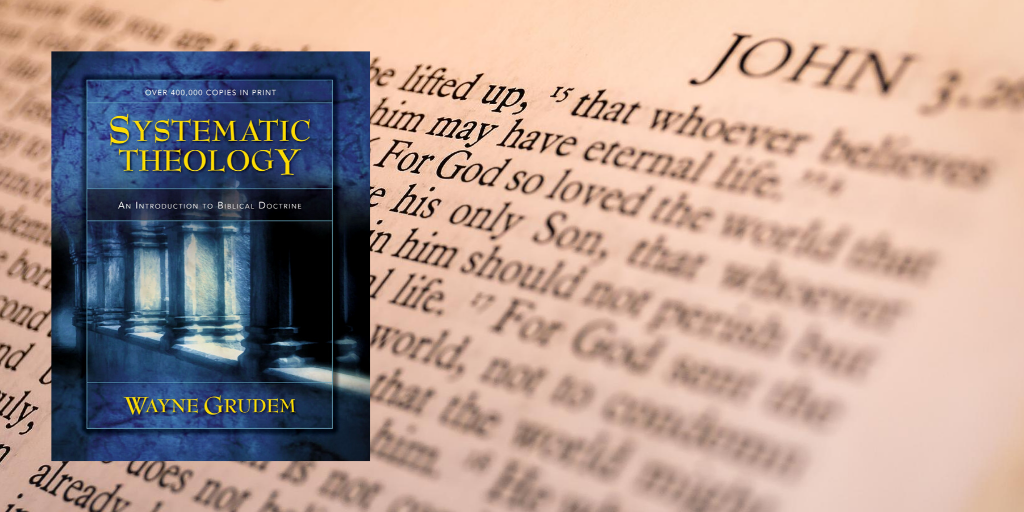A free 57-part study guide to Wayne Grudem’s classic book, Systematic Theology: An Introduction to Biblical Doctrine with topics, summaries, and links.
In July 2019, I began a theology reading group with several guys. We completed reading through Wayne Grudem’s Systematic Theology: An Introduction to Biblical Doctrine 13 months later. In addition to the reading group and listening to his 148 corresponding lectures, I blogged through all 57 chapters in Grudem’s book. The aim of each blog post was to provide a synopsis of the chapter in the book, review key themes, provide the core terms covered, and show additional resources for each topic for further study.
For ease of reference in this Systematic Theology Study Guide, I included a link to each of the posts with the summary of the topics covered in the post and chapter.
Part 1: The Doctrine of the Word of God
Introduction to Systematic Theology – Chapter 1
What is systematic theology? Why should Christians study it? How should we study it?
The Word of God – Chapter 2
What are the different forms of the Word of God?
The Canon of Scripture – Chapter 3
What belongs in the Bible and what does not belong?
The Authority of Scripture – Chapter 4
The Four Characteristics of Scripture: (1) Authority: How do we know that the Bible is God’s Word?
The Inerrancy of Scripture – Chapter 5
Are there any errors in the Bible?
The Clarity of Scripture – Chapter 6
The Four Characteristics of Scripture: (2) Clarity – Can only Bible scholars understand the Bible rightly?
The Necessity of Scripture – Chapter 7
The Four Characteristics of Scripture: (3) Necessity – For what purposes is the Bible necessary? How much can people know about God without the Bible?
The Sufficiency of Scripture – Chapter 8
The Four Characteristics of Scripture: (4) Sufficiency – Is the Bible enough for knowing what God wants us to think or do?
Part 2: The Doctrine of God
The Existence of God – Chapter 9
How do we know that God exists?
The Knowability of God – Chapter 10
Can we really know God? How much of God can we know?
The Character of God: “Incommunicable” Attributes – Chapter 11
How is God different from us?
The Character of God: “Communicable” Attributes – Part 1 – Chapter 12
How is God like us in his being, and in mental and moral attributes?
The Character of God: “Communicable” Attributes – Part 2 – Chapter 13
How is God like us in attributes of will and in attributes that summarize his excellence?
God in Three Persons: The Trinity – Chapter 14
How can God be three persons, yet one God?
Creation – Chapter 15
Why, how, and when did God create the universe?
God’s Providence – Chapter 16
If God controls all things, how can our actions have real meaning? What are the decrees of God?
Miracles – Chapter 17
What are miracles? Can they happen today?
Prayer – Chapter 18
Why does God want us to pray? How can we pray effectively?
Angels – Chapter 19
What are angels? Why did God create them?
Satan and Demons – Chapter 20
How should Christians think of Satan and demons today? Spiritual warfare.
Part 3: The Doctrine of Man
The Creation of Man – Chapter 21
Why did God create us? How did God make us like himself? How can we please him in everyday living?
Man As Male and Female – Chapter 22
Why did God create two sexes? Can men and women be equal and yet have different roles?
The Essential Nature of Man – Chapter 23
What does Scripture mean by “soul” and “spirit”? Are they the same thing?
Sin – Chapter 24
What is sin? Where did it come from? Do we inherit a sinful nature from Adam? Do we inherit guilt from Adam?
The Covenants Between God and Man – Chapter 25
What principles determine the way God relates to us?
Part 4: The Doctrines of Christ and the Holy Spirit
The Person of Christ – Chapter 26
How is Jesus fully God and fully man, yet one person?
The Atonement – Chapter 27
Was it necessary for Christ to die? Did Christ’s entire earthly life earn any saving benefits for us? The cause and nature of the atonement. Did Christ descend into hell?
Resurrection and Ascension – Chapter 28
What was Christ’s resurrection body like? What is its significance for us? What happened to Christ when he ascended into heaven? What is meant by the states of Jesus Christ?
The Offices of Christ – Chapter 29
How is Christ prophet, priest, and king?
The Work of the Holy Spirit – Chapter 30
What are the distinctive activities of the Holy Spirit throughout the history of the Bible?
Part 5: The Doctrine of the Application of Redemption
Common Grace – Chapter 31
What are the undeserved blessings the God gives to all people, both believers and unbelievers?
Election and Reprobation – Chapter 32
When and why did God choose us? Are some not chosen?
The Gospel Call and Effective Calling – Chapter 33
What is the gospel message? How does it become effective?
Regeneration – Chapter 34
What does it mean to be born again?
Conversion (Faith & Repentance) – Chapter 35
What is true repentance? What is saving faith? Can people accept Jesus as Savior and not as Lord?
Justification – Chapter 36
How and when do we gain right legal standing before God?
Adoption – Chapter 37
What are the benefits of being a member of God’s family?
Sanctification – Chapter 38
How do we grow in Christian maturity? What are the blessings of Christian growth?
Baptism in and Filling with the Holy Spirit – Chapter 39
Should we seek a “baptism in the Holy Spirit” after conversion? What does it mean to be filled with the Holy Spirit?
The Perseverance of the Saints – Chapter 40
Can true Christians lose their salvation? How can we know if we are truly born again?
Death and the Intermediate State – Chapter 41
What is the purpose of death in the Christian life? What happens to our bodies and souls when we die?
Glorification – Chapter 42
When will we receive resurrection bodies? What will they be like?
Union with Christ – Chapter 43
What does it mean to be “in Christ” or “united with Christ”?
Part 6: The Doctrine of the Church
The Church: Its Nature, Its Marks, and Its Purposes – Chapter 44
What is necessary to make a church? How can we recognize a true church? The purposes of the church.
The Purity and Unity of the Church – Chapter 45
What makes a church more or less pleasing to God? What kinds of churches should we cooperate with or join?
The Power of the Church – Chapter 46
What kind of authority does the church have? How should church discipline function?
Church Government – Chapter 47
How should a church be governed? How should church officers by chosen? Should women serve as pastors of churches?
Means of Grace within the Church – Chapter 48
What are the different activities within the life of the church that God uses to bring blessings to us? What do we miss if we neglect involvement in a local church?
Baptism – Chapter 49
Who should be baptized? How should it be done? What does it mean?
The Lord’s Supper – Chapter 50
What is the meaning of the Lord’s Supper? How should it be observed?
Worship – Chapter 51
How can our worship fulfill its great purpose in the New Testament age? What does it mean to worship “in spirit and in truth”?
Gifts of the Holy Spirit (1) – Chapter 52
What are spiritual gifts? How many are there? Have some gifts ceased? Seeking and using spiritual gifts.
Gifts of the Holy Spirit (2) – Chapter 53
How should we understand and use specific spiritual gifts?
Part 7: The Doctrine of the Future
The Return of Christ: When and How – Chapter 54
When and how will Christ return? Could he come back at any hour?
The Millennium – Chapter 55
What is the millennium? When does it occur? Will Christians go through the Great Tribulation?
The Final Judgment & Eternal Punishment – Chapter 56
Who will be judged? What is hell?
The New Heavens and New Earth – Chapter 57
What is heaven? Is it a place? How will the earth be renewed? What will it be like to live in the new heavens and new earth?
Additional Resources by Wayne Grudem
- Wayne Grudem: Book: Systematic Theology: An Introduction to Biblical Doctrine
- Wayne Grudem: 148 Lectures on Systematic Theology at Scottsdale Bible Church
Photo by James Coleman on Unsplash.








